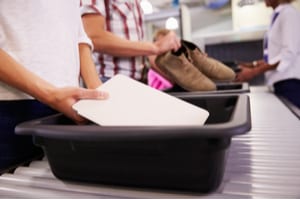
How Serious are the Charges for a Crime Committed at an Airport?
Air travel has become increasingly popular over the last few years as prices have dropped, making this mode of transportation more viable for most Americans. With this increased traffic in airports comes an increased amount of criminal activity. That’s partly because passengers might not know the federal rules and regulations governing the airport. Airports are federal property, so they’re run under federal law. That means any mishap with law enforcement authorities is taken more seriously than if it were to happen at another public place. Most crimes are prosecuted in a state court, but some are prosecuted in federal court.
Examples of those federally prosecuted crimes include the following:
- Possession of a concealed weapon
- Drug possession
- Assaulting someone who works at the airport
- and disruptive behavior.
Let’s take a closer look at each of those crimes.
Concealing a Weapon at the Airport
This offense has been the most prevalent after the TSA started employing more sophisticated screenings for passenger carry-on items. In 2014, more than 2,200 firearms were found in airports across the country during TSA checkpoints. About 80% of those guns were loaded. That figure almost doubled in 2018 when more than 4,200 guns were found and 86% of them were loaded.
While passengers can travel with a firearm on commercial flights, there are six rules that they must follow in order to do so. Those rules include:
1) The firearm must not be loaded – The TSA’s definition of a firearm is a weapon that’s created to eject explosives or bullets. This definition covers a variety of guns, including a starter gun, shotgun, rifle, pistol, silencer, and a flare gun. Even if you’re traveling with a BB or compressed air gun, it’s wise to give the TSA notice before they discover it.
2) The federal definition of a firearm is used by the TSA – Federal law states that a loaded firearm has a “live round of ammunition in the cylinder or chamber.” Always double-check that your gun is empty and unloaded before traveling with it.
3) Place the firearm in a secure & locked case – To travel with your unloaded gun, you must have it enclosed in a locked case that’s either metal or hard plastic.
4) Store the secured and unloaded weapon in luggage – After the firearm is safely contained in a locked case, that case must be placed in your luggage. But do not label that luggage, since it could cause alarm to some knowing you have an unloaded firearm in your bag.
5) Securely Package Ammunition – In addition to the firearm itself, a traveler must also notify and declare to the TSA that he or she is carrying ammunition. The ammunition must be stored in a box that’s made specifically for safe storage of ammunition. It’s always a good idea to check with the individual airline that you’re flying with to be sure you’re following any additional preferences that they might have regarding commercial travel of firearms and ammunition.
6) Notify the Airline that You’ll Be Traveling with Your Firearm – When checking in at the airline counter, make sure that they’re aware that you’ll be traveling with a safe and securely placed firearm that’s unloaded.
Other weapons (i.e., knives, explosives, and hoax devices) are prohibited on commercial flights. Following these rules will avoid a criminal gun possession charge.
Drug Possession at the Airport
To avoid federal drug violations, travelers should avoid bringing any drugs or drug paraphernalia to the airport. If airport investigators believe that a traveler is hiding drugs in their luggage, federal authorities usually get involved.
Many states have passed laws to decriminalize marijuana, but not all. While the state of Florida has made medical marijuana legal, Orlando International Airport quickly banned travelers from carrying it – even with a prescription. Airports in Jacksonville, Tampa, and Fort Lauderdale have not enforced this same ban, but it’s still wise to avoid traveling with medical marijuana and avoid facing any criminal allegations.
Assaulting a Person who Works at the Airport
As airline travel has increased, so have lines, wait time and delays in flight schedules. Passengers who grow frustrated and make a wrong decision at the airport can find themselves being prosecuted under federal law. Assaulting a person who works at the airline is usually one of those instances.
There have been reports of front-line customer service employees at the Miami airport getting cursed at or having luggage thrown at them by travelers who are frustrated with wait times and baggage fees. This type of assault and “airport rage” can mean criminal charges for the traveler. Specifically, it’s a federal crime if a traveler assaults any flight crew member, flight attendant, and/or pilot.
Disruptive Behavior at the Airport
An airline passenger can be charged with disruptive behavior if their actions have prevented airline employees from performing their tasks. Examples of those behaviors include the following:
- Intimidation
- Verbal threats
- Physical threats
- Assault
That becomes a federal crime if the aircraft’s doors are closed and are no longer connected to the airport by a ramp. If the plane is connected to the airport, then the state or local law will usually apply for these behaviors. If this disruptive behavior happens on an international flight, the destination country can legally charge the disruptive individual.
Contact a Professional Federal Airport Crimes Lawyer
If you’ve committed a crime at the airport, the charges can be severe. You’ll likely be facing either federal or state violations and you’ll need expert legal counsel to assist you with.
Attorney William Umansky and his team of federal criminal defense lawyers have the necessary skill to fight for your freedom and rights in a state or federal court of law. Don’t delay and contact us immediately for your free case review. Fill out a form online or call anytime.


